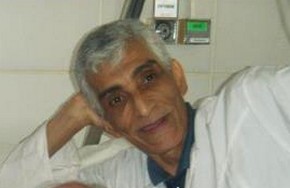Murmures
Décès du comédien et acteur Hassan Mediaf (Maroc)
février 2013 | Décès de personnalités culturelles | Cinéma/TV | Maroc

Français
L’acteur marocain est décédé Hassan Mediaf le 30 janvier 2013 à Casablanca où il était hospitalisé depuis plusieurs mois pour une maladie respiratoire grave. Il avait 63 ans.
L’acteur, très connu au Maroc, avait notamment joué dans les séries « Hdidane » et « Romana ou Bartal », diffusées par la chaine de télévision 2M. Il est également célèbre pour avoir interprété divers personnages dans le théâtre.
L’acteur, très connu au Maroc, avait notamment joué dans les séries « Hdidane » et « Romana ou Bartal », diffusées par la chaine de télévision 2M. Il est également célèbre pour avoir interprété divers personnages dans le théâtre.
English
The Moroccan actor Hassan Mediaf died on Wednesday the 30th of January at the age of 63. He was suffering from respiratory problems. Mediaf had been admitted to a private clinic in Casablanca last September at the expense of King Mohammed VI. Mediaf will be remembered for his contributions to national theatre, television and cinema as an actor since the 1970s. However, most domestic spectators are likely to remember him for his appearances in popular tele-films, particularly Fatima Boubekdi’s Douiba et Souk Nssa, and the TV series Oujaa Trab, Hdidan and Romana wa Bartal. Mediaf also played roles in many Moroccan films including Hassan Benjelloun Yarit (1993), Hakim Noury’s The Dreams Thief (1995), Swel and Imad’s Heaven’s Doors (2005), and most recently Ismail Ferroukhi’s Free Men (2011) and Nabil Ayouch’s God’s Horses (2012). In September 2012, Mediaf made the headlines in Morocco after his admission to a clinic at the expense of King Mohammed VI. Media reports revealed the extreme poverty in which the actor lived. The actor shared an attic with his family next to a public oven in a working-class neighbourhood in Casablanca. The exposure to the smoke was behind his respiratory problems, doctors revealed to the official news agency. The king also donated a house to the ailing actor. The Mediaf case reveals the penury of some Moroccan artists but we should be careful so as not to overemphasise this fact. In their public appearances on national television or in the corridors of film festivals, Moroccan actors like to tell the story of their material vulnerability to anyone willing to hear their tales. They sometimes give the impression that they are the only vulnerable professional or social group in Morocco. The truth is that poor as some of the actors might be, many have cashed on the growth of public and private funding for television and film production in the new century. To justify their entitlement to special treatment in a low-income country, actors and artists like to stress their contribution to society and national heritage. Some also point out the social security enjoyed by their peers in Western countries. They are however reluctant to discuss the question of who is an’actor’ because many are in the field without enough talent to justify even the health coverage granted to them by previous governments nor the common occurrence of their own admission or members of their families to the best hospitals and clinics in Morocco at the expense of the royal palace and, by extension, the taxpayer’s money. It is not my intention to contest the right of Moroccan actors and artists to health care and welfare payments, but the national cultural field needs tougher regulation to guarantee the quality of cultural production and the good management of public funds. It is unlikely that the current government will be able to resolve these issues given their intersection with the larger need for genuine reforms to the political system itself.
JAMAL BAHMAD
(currently writing a PhD dissertation on Moroccan cinema at the University of Stirling in Scotland (UK), writes about north African cinema and culture).
JAMAL BAHMAD
(currently writing a PhD dissertation on Moroccan cinema at the University of Stirling in Scotland (UK), writes about north African cinema and culture).
Partager :



